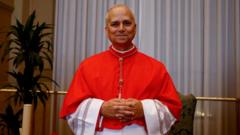Pope Leo XIV, elected on May 8, 2025, is seen as a potential catalyst for change within the Catholic Church, balancing American perspectives with international responsibilities.
Pope Leo XIV: The First American Pontiff and His Global Impact

Pope Leo XIV: The First American Pontiff and His Global Impact
The election of Pope Leo XIV marks a significant shift in the Vatican's leadership dynamics, as Robert Francis Prevost from the US ascends to the papacy.
Robert Francis Prevost, now recognized as Pope Leo XIV, stands as the first American pontiff in the history of the Roman Catholic Church. His election has generated considerable attention, particularly for its implications on the global Catholic community. Holding a pivotal role within the Vatican, Prevost previously managed the office responsible for appointing and overseeing bishops around the world, allowing him to establish a broad network across varying cultural contexts.
His election on May 8, 2025, which came after two days of secretive deliberations among 133 voting cardinals, marks a departure from the expectations that a cardinal from a global superpower like the United States would ascend to this high office. This pivotal decision, celebrated by some and criticized by others, positions Pope Leo XIV to potentially disrupt established norms within the church's hierarchy.
Prevost's upbringing in Chicago and subsequent international tenure, particularly in Peru where he gained citizenship, illustrate his commitment to a pan-Catholic vision that transcends borders. This background could enable him to act as a bridge between conservative ideologies and the progressive causes championed by his predecessor, Pope Francis.
Although his election may appeal to more traditional Catholic voters in the United States, it also poses challenges amidst an increasingly polarized religious landscape. Many view him as a figure capable of reconciling divergent forces within American Catholicism — navigating the complexities brought forth by eras of political activism that have sought to reshape the church's role in society.
Thus, while some constituents may perceive his American background as a defining characteristic, it is Prevost’s expansive worldview, coupled with deep-rooted ecclesiastical experience, that signals his potential influence on the direction of the church globally, potentially altering the power balance that has long persisted.























